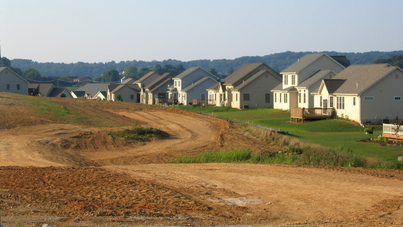Author
Overage is a key method which landowners can use to secure a share of additional value post-sale of their land. It is a regular feature in strategic land deals and can be a useful tool where land values or future sales receipts may be improved or where savings are made with development costs which the landowner wishes to benefit from. Such matters are often uncertain when a deal is originally put together.
Overage, in its simplest form, will entitle a landowner (in addition to the sale proceeds it has already received) to clawback a percentage share of any increase in value of a development. The additional value could be generated by either a new or improved planning permission, unexpectedly high sales receipts or through cost savings enjoyed by a developer.
The advice of a specialist land agent should be sought in relation to any proposed overage terms and particular attention should be given to the following issues:
1. How long will the overage last?
To be enforceable an overage must be imposed for a defined period. The appropriate ‘overage period’ will depend on several factors. For example, consider the immediate development prospects of the land. If the site is ten years away from getting planning then a longer overage period will usually be more appropriate, however, if overage runs for decades the terms may not reflect market conditions or there may be issues in tracing beneficiaries. If a site already has planning, then a shorter period may be suitable and a developer should expect it to run for the life of the scheme. If considering an overage based on sales receipts, ensure the overage includes a calculation of the market value of any un-built or un-sold units which exist at the end of the overage period (and captures those values within the overage calculation) otherwise, a developer could sit on its heels and build out slowly to avoid paying overage.
2. What will ‘trigger’ the overage?
When will the obligation to pay overage arise? This could be the grant or implementation of a new planning permission for development. A developer will prefer implementation to avoid being hit by overage before it commits to develop. ‘Turn’ overage will capture the re-sale of the site for a higher price than the purchasing developer paid the landowner. It is important to ensure that a turn overage is triggered not just by a land sale but also by a sale of any corporate entity owning the land (to avoid the overage being circumvented by a share sale). Sales overage is also common, here overage is triggered where the developer’s gross receipts or profits exceed an agreed cap or where a developer manages to secure a reduced quota of affordable housing (thus increasing the amount of ‘open-market’ units and therefore value in a development). Consideration should be given to whether the developer is required to obtain or improve the planning position and the relevance of permitted development rights in the context of the overage trigger should also be considered.
In short, overage can be tailored to a broad range of circumstances. It is becoming more frequently used and so developers are becoming more amenable to it being included within a deal.
3. How will the overage be calculated?
Generally, this will be a percentage share of any increase in value or profit. Other key considerations in the calculation of overage will include:
- Whether a developer will be able to deduct certain costs before it pays overage – these might include planning costs or sales costs which a developer has incurred. If such costs are to be deducted, then consider whether they should be subject to an agreed cap.
- Who will undertake the overage calculation? Usually, the parties will seek to reach agreement on the amount payable and in the absence of agreement the calculation will be determined by an independent valuer or expert. However, the parties may decide that the calculation should be referred to an expert from the outset to avoid delay.
- Wherever possible a ‘worked example’ should be annexed – this is a hypothetical calculation which the parties’ commercial advisers or agents will usually produce. This should help to establish an agreed calculation of the overage and minimise legal negotiations.
4. Overage security
Landowners need to ensure that the overage will be enforceable against future owners. The two main methods to achieve this are:
- Imposing a restriction on the developer’s registered title to the site – this will prevent a sale of the site without the new purchaser entering into an agreement with the landowner to ensure they continue to be bound by the overage terms.
- Entering into a legal charge in favour of the landowner. This will be more appropriate where there is a shorter overage period and an immediate expectation that overage will be due. Developers will usually resist a legal charge as this may frustrate or complicate their own funding arrangements.
5. Releases and ‘permitted disposals’
Developers will usually require ‘permitted disposals’ which they can take control of, complete and register at Land Registry free from the security. For example, it will want to be able to sell completed houses without the plot purchaser facing liability under the overage. It is important for the parties to establish an agreed list of permitted disposals to avoid unnecessary negotiations of the legal documentation.
It is also important to agree on a structure by which those permitted disposals can take place. Where a development involves hundreds of units it will seldom be appropriate for a landowner to be involved in each and every release. Instead, it can be advisable to limit consent to key milestones – for example, on the sale of a house which results in 25%, 50% and / or 75% of the total units on site being sold. This is particularly useful where overage is linked to sales receipts and means a developer will need to engage with a landowner at regular intervals (preferably on an open book basis) to complete its remaining sales.
6. Tax and estate planning
With any luck an overage could secure the landowner additional future income. The landowner should plan ahead in anticipation of any further receipts because these may trigger additional Capital Gains Tax, Income Tax or Inheritance Tax liabilities. Landowners proposing to enter into overage arrangements should therefore always seek tax and / or succession-planning advice prior to completing their deal.
6. Should overage be used?
While overage may provide a landowner future returns, be wary where part of the upfront purchase price is reduced for overage. Best value may be better obtained by negotiating a ‘clean’ sale price rather than being reliant on future circumstances that may never arise or risk a dispute over complicated overage terms. Overage will, however, likely continue to be included on development sales as a fair way to establish the true value of the land’s development potential.
Further and more detailed information about other elements of strategic land can be found here.
This article is for general information only and does not, and is not intended to, amount to legal advice and should not be relied upon as such. If you have any questions relating to your particular circumstances, you should seek independent legal advice.
Author
Michelmores Property Development Club
The Michelmores Property Development Club (PDC) is a forum for developers and property professionals to connect and share knowledge. The Club is celebrating its 22nd...
Michelmores Property Awards
Celebrating the best of property, development and construction in the South West The Michelmores Property Awards celebrate the best property, development and construction projects in...



